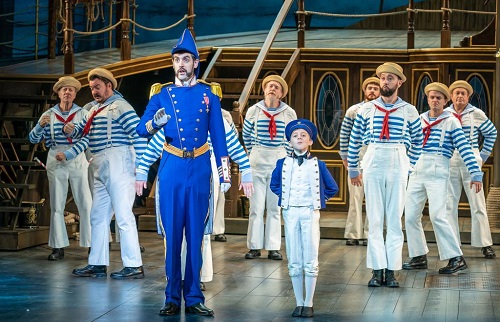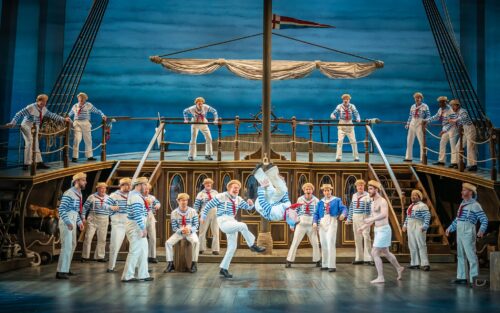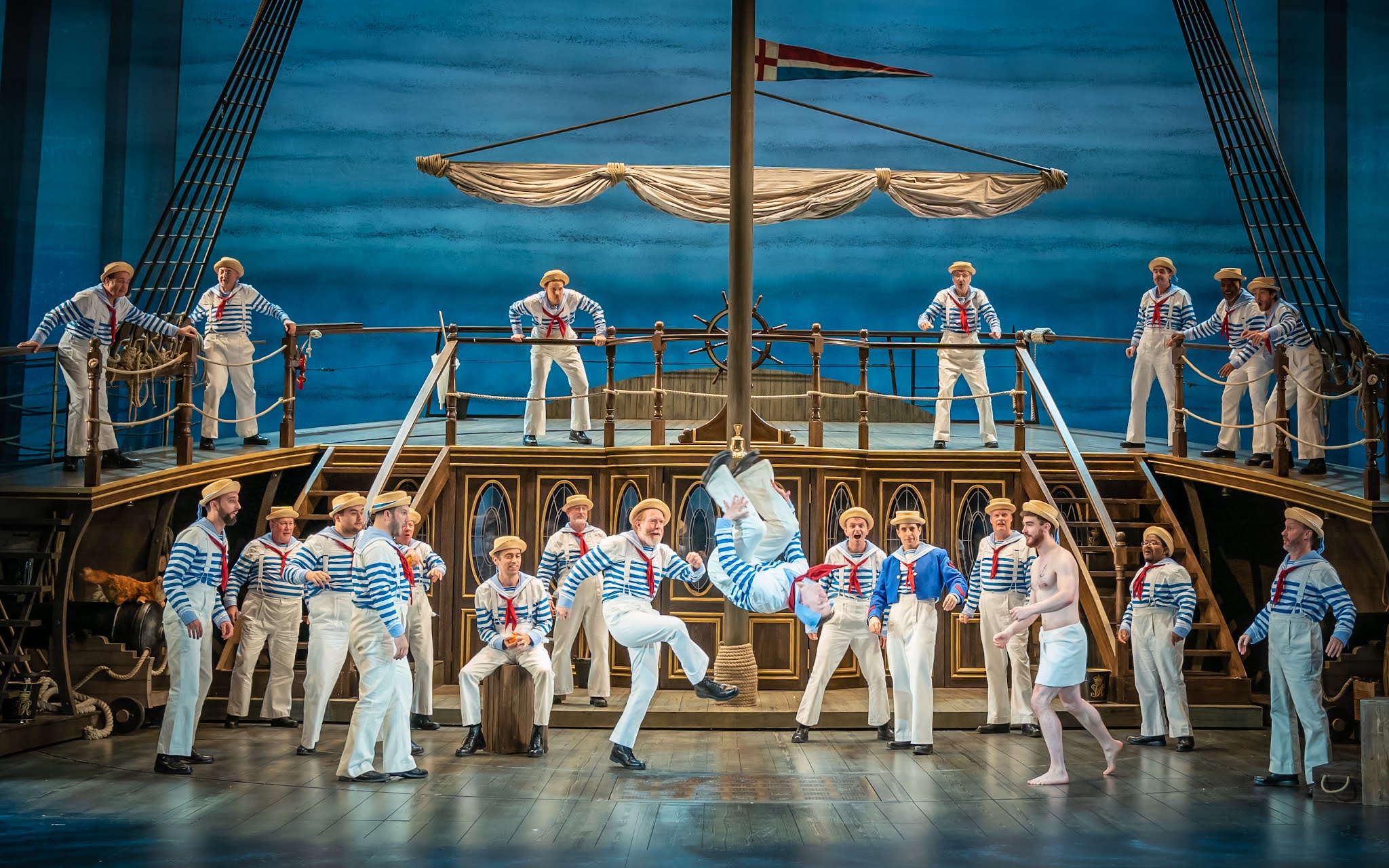 United Kingdom Gilbert & Sullivan’s HMS Pinafore: Soloists, Chorus and Orchestra of English National Opera / Chris Hopkins (conductor). London Coliseum, 29.10.2021. (JB)
United Kingdom Gilbert & Sullivan’s HMS Pinafore: Soloists, Chorus and Orchestra of English National Opera / Chris Hopkins (conductor). London Coliseum, 29.10.2021. (JB)

Production:
Director – Cal McCrystal
Set & Costume designer – takis
Lighting designer – Tim Mitchell
Choreographer – Lizzi Gee
Cast:
Sir Joseph Porter – Les Dennis
Captain Corcoran – John Savournin
Ralph Rackstraw – Elgan Llŷr Thomas
Dick Deadeye – Henry Waddington
Bill Bobstay – Marcus Farnsworth
Bob Becket – Ossian Huskinson
Josephine – Alexandra Oomens
Little Buttercup – Hilary Summers
Hebe – Bethan Langford
Tom Tucker – Rufus Bateman
Sergeant of the Marines – Spence Darlaston-Jones
Aunt Minje – Flick Ferdinando
It is astonishing how the wit of Sir William Schwenck Gilbert has remained so pertinent in our own times: here is The Rt. Hon. Sir Joseph Porter, K.C.B. (First Lord of the Admiralty) introducing himself to the Captain and Crew of HMS Pinafore (hereafter Pinafore) in his opening patter song:
I grew so rich that I was sent
By a pocket borough into Parliament.
I always voted at my party’s call,
And I never thought of thinking for myself at all.
I thought so little, they rewarded me
By making me the Ruler of the Queen’s Navee!
[Chorus: He thought so little, etc]
Now landsmen all, whoever you may be,
If you want to rise to the top of the tree,
If your soul isn’t fettered to an office stool,
Be careful to be guided by this golden rule –
Stick close to your desks and never go to sea,
And you all may be Rulers of the Queen’s Navee!
[Chorus: Stick close, etc]
Sound familiar? Great too that little trick of having the chorus parrot the Leader. A proud, English tradition presented as jokey with a deadly serious face.
Pinafore was Gilbert and Sullivan’s first runaway success; England, then America, couldn’t get enough of it. Chappell Music was churning out vocal scores in bucketfuls. Schwenck (always addressed by his second name within the family) got to work with Germanic fury at the Americans’ ‘oversight’ in coughing up Royalties – a matter which he only partially set to rights within his lifetime. Wilde and Shaw both acknowledged their debt to Gilbert for their stage plays, in the certain knowledge (then as now) that you can’t copyright an idea or technique. The musical had found a new Lifeforce! Andrew Lloyd Webber is only one of the latest to have checked in to that amazing gold mine.
Moreover, WSG was the stage director of his own libretti and even failure to observe a comma would cause an outburst of something near violence. Mr Gilbert wants, and what Mr Gilbert wants, Mr Gilbert shall have. There was respect for Gilbert. And not a little fear. Rehearsals could indeed be dramas of their own. What with Sir Henry Lytton (the only member of the D’Oyly Carte company to be given a knighthood, even after he was habitually shooting himself up with potent drugs) and eventually married to Bertha Lewis (the booming contralto whose art was what would much later define Dame Margaret Rutherford’s career of playing comedy ‘straight’). Though what G&S would no doubt have really liked was the greater boom of Clara Butt (also Dame) who was daughter of a sea captain, and narrowly missed being born on the waves. Younger sister, Ethel, was obliged to make her debut as Ethel Hook as Clara dictated, thou shalt have no other Butts but me!
Perhaps it is too much to expect such imaginative casting and directing to be reproduced in our own times. But for all its faults, there is much to be enjoyed in the English National Opera new staging. Puritans should stay away. For the rest, this production is pure, unadulterated fun.
Not least of these pleasures is the hornpipe which opens Act II. (This reminds me of a gopak which I had the affrontery to introduce in Act II’s beginning with a hugely talented and supremely athletic group of sixth formers at St George’s English School in Rome in the 1990s. They stole the show. Then repeated it at my Christmas Day Party a few weeks later.)

Choreographer Lizzi Gee came into her own in the hornpipe, much as she had in ENO’s Iolanthe where Jonathan Miller’s robust ladies of the chorus made their appearance stampeding through the fairies’ tripping hither, tripping thither. For Pinafore Lizzi was helped by the extremely tall John Savournin (Captain Corcoran) in some nifty hornpipe tapdancing with the very small – and very young – partner, Rufus Bateman’s Tom Tucker (a new character). The applause rose beautifully to something thunderous. Praise too to the chorus of sailors with daring somersaults. At the opening of Act II, John Savourinin’s song to the moon was also charmingly delivered.
I must choose my words carefully as I try to report on what my ears tell me was a bitter disappointment with the singing in this show. With few exceptions, the singers were going for it as though their lives depended on it. Effortlessness was G&S’s prime requirement. I am reminded of Wilde interrupting a rehearsal of The Importance of Being Earnest saying to an actor, Please don’t work hard to make my words sound comic Mr J; they are comic and should be delivered as you deliver speech in daily life. Camping up a text which is already camp is the surest way to destroy it.
Cruelly, and with the best of intentions, that is what happened in tonight’s performance. In some cases this was a casting problem. Hilary Summers has a lightweight voice, which the more she forces – and forcing is what she does – she is lightyears from the warm, booming necessary contralto of Little Buttercup. She is called upon to roar with the powerful tones of Bertha Lewis, which seemingly she does not have. (Listen to Lewis’s recordings which have come down to us.)
Gilbert, among his many attributes, was a classicist. Pretty well all the G&S plots owe much to Aristophanes, Father of Comedy, which established itself only five or so years after its more respectable sister, Tragedy. Swapping the babies at birth, in this instance through Little Buttercup being hard of hearing. Aunt Sallies are set up to be knocked down. Fifth century BC humour was lavatory prone. But in Victorian translations this was edited out. No one takes their clothes off in G&S (they might have done if Lindsay Kemp had got to know these plays!).
Gilbert’s topsy-turveydom is his main playing card. These operas have got an identical plot so the narrative doesn’t much matter / So it’s fun to poke fun with ‘most everyone with your typical, topical chatter, as Anna Russell neatly noted. The captain’s daughter, Josephine (Alexandra Oomens) is a repellent little prig to whom Sullivan hands the punishment of an operatic aria: sharp change of gear here. The hours creep on apace (Josephine’s grand scena in Act II) would be moving if Dame Janet Baker were singing it: a singer with soul if ever there was one. But Oomens has not the merest indication of soul. She is too busy trying to make an effect cataloguing her Carved oak and tapestry from distant Rome. In a weird way this perfectly portrays Josephine’s nasty preoccupation as to where the next comfort will be coming from. But Sullivan’s music is also calling for our empathy in this drama. And therein Oomens fails us.
Ralph Rackstraw fares much better. The Welsh tenor, Elgan Llŷr Thomas, has a golden tenor voice which can weep as well as it can soar. Handsome too. And fleet of foot. And he was the only singer who was not forcing his delivery. (I recall his excellent Peter Quint in ENO’s The Turn of the Screw.) Expression? Yes. Drama? Yes. Forcing? No. I am surprised we are not hearing a lot more of him. His introductory ballad, A maiden fair to see, is not a demanding aria, but with the Thomas artistry it is pure magic. He makes a fine contribution too to the glee with Boatswain (Marcus Farnsworth), Boatswain’s Mate (Ossian Huskinson) and chorus, A British tar is a soaring soul.
The programme tells me that Les Dennis (Sir Joseph) is one of the UK’s entertainers, with a career in showbusiness spanning 50 years. Imagine! He played to the gallery the whole of the way. Lots and lots of what in G&S circles is called business. Ad-libbing as though there were no tomorrow. Has no one told him that less is more on a stage. This was not just me. The full house found him as wearisome as I did. Still, I daresay that every night will be different for Les Dennis. Like all artists who began in the music halls, improvisation is the order of the day. But those ladies and gentlemen knew how to measure their improvisations; this is an art which is riddled with traps for the unwary.
Greek designer, takis does a wonderful job with the seafaring set and costumes. As always, Sir Joseph has more cousins and aunts than sisters, but their crinoline petticoats give a whirl of colour to fill the huge stage of ENO with Lizzi Gee’s inspired choreography and Tim Mitchell’s changing lighting. The quarter deck of HMS Pinafore is also a handsomely designed ship with the decks above and cabins below, reflecting Victorian grandeur in a more simplistic dignity than we are used to. All glory to takis
It seems to me that Cal McCrystal did not have the sure-hand touch which I had enjoyed in his Iolanthe. Chris Hopkins conducting held the show together, even though there were moments when I was missing the true spark of G&S. It was all somewhat routine in places.
(I had better add that because of a railway breakdown, I arrived after the start of Act I. Along with half a dozen others we were shown to a corridor where we were allowed to watch and hear the first act on a very small screen with a somewhat unfocused vision and hordes of umpteen ENO employees passing backwards and forwards. Surely ENO ought to have a more professional arrangement for unavoidable late arrivals? This is London, after all.)
I haven’t been to ENO for some five years and it was a pleasure to see it looking so polished and clean. Very friendly, helpful staff and refreshments at affordable prices.
Jack Buckley

Less is more indeed! Three important characters seem to have been omitted from reviews. Dick Deadeye (Henry Waddington) (I might cast a real disabled performer in the role), Cousin Hebe (Bethan Langford) and the Bosun (Marcus Farnsworth). Upstaged by too much Midshipmite and aged aunt?
I like underplayed new ideas e.g. in my Sir Joseph (thanks to directors Jeff and Jeff) at one stage I just gasped for ‘water’ instead of ‘and a Lord who rules the water’. A disembodied arm provided a glass of water. That was decades ago.
However an intelligent approach to the ages of the female relatives is possible. D’Oyly Carte had them all young. One recording with the Mike Sammes Singers had an old Hebe (Enid Heard) & she was hilarious.
The D’Oyly Carte ‘Pinafore’ (from tv), or what remains of it after filtering out of some of the tradition is about to be re-released on dvd. The company were open to change. What did the Arts Council know about operetta? The great company should have continued with smaller tours & other operetta repertoire. They had the style to a t..